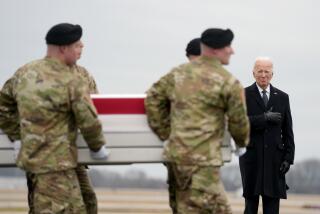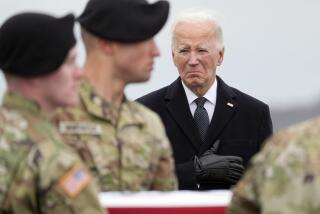U.S. Death Toll in Iraq Hits 2,000
BAGHDAD — The Pentagon announced Tuesday that three more Americans serving in Iraq had been killed, lifting the U.S. military death toll to 2,000 and triggering a new round of protest and debate in the United States over the 2 1/2 -year conflict.
The new deaths were those of two Marines slain Friday in a roadside bombing near Amiriya, west of Baghdad, and a soldier who succumbed Saturday after being wounded last week by a similar blast in Samarra, north of the capital.
The fatalities reflected two troubling trends for the 140,000 U.S. troops stationed in Iraq — the growing loss of life caused by roadside bombs and the capacity of insurgents to re-infiltrate areas swept by U.S. offensives.
Thousands of Iraqis have been killed and more than 15,000 U.S. troops have been wounded since American-led forces invaded Iraq in March 2003 to topple President Saddam Hussein. At that time, Associated Press began a tally of U.S. military fatalities, and the casualties announced Tuesday brought the death toll to 2,000.
The milestone came amid declining support for the war in the United States, and activists planned a series of demonstrations.
Cindy Sheehan, the antiwar protester who lost a son in Iraq, began demonstrating Tuesday in front of the White House. MoveOn.org, a leading opponent of the war, planned candlelight vigils across the country in remembrance of troops who have died. The organization also planned to air TV ads about the passing of the 2,000 mark.
President Bush and top administration officials have made new appeals for patience in recent days, arguing that progress is being made.
“Iraq has made incredible political progress, from tyranny to liberation to national elections to the ratification of a national constitution in the space of 2 1/2 years,” Bush said to applause Tuesday as he spoke to wives of military officers at Bolling Air Force Base in Washington, D.C.
While counseling that “no one should underestimate the difficulties ahead,” Bush rejected the criticism that the war has prompted a new wave of terrorism. “I would remind them that we were not in Iraq on Sept. 11,” he said.
Recently, some Republican lawmakers have begun to speak out in favor of reducing U.S. troop levels in Iraq, but the White House has been trying to damp such discussions. “Our strategy is to hold, clear and build,” Secretary of State Condoleezza Rice said at a Senate hearing last week.
Tuesday’s milestone drew sharply differing reactions from Congress. Democrats pointed to the losses and criticized the war, as Republicans complained that their opponents were trying to exploit the moment for political advantage.
Sen. Robert C. Byrd (D-W.Va.) called the moment “another tragic milestone in this costly war, in which too much blood has been spilled already.”
But Sen. John Cornyn (R-Texas) said the figure was “an artificial landmark. Of course we grieve over each one of those losses, but it’s an artificial number that some are using to try to undermine support for our effort there. These are people without any constructive alternative; is cutting and running what we’re supposed to do?”
The Senate observed a moment of silence for the fallen troops. Democrats in the House read the names of all service members who had died.
As the number of deaths has climbed steadily and the insurgency shows no sign of weakening, even some Bush administration officials have begun to question a key assumption of American strategy: that the establishment of democracy in Iraq can erode support for and ultimately eradicate the guerrillas.
At the same time, senior U.S. commanders have acknowledged that the presence of American forces is inflaming the armed opposition.
While stepping up the training of Iraqi units to take over the fight, U.S. forces have continued to take the lead in striking the insurgency.
“The insurgents are still there,” Army Maj. Gen. Rick Lynch, a U.S. military spokesman in Iraq, told reporters last week. “They still want to derail the democratic process. They still want to discredit the Iraqi government, so operations continue.”
Of the three troops whose deaths were announced Tuesday, only one was identified by name. Staff Sgt. George T. Alexander Jr., 34, of Killeen, Texas, was wounded Oct. 17 in the town of Samarra, the Pentagon said, and died Saturday at Brooke Army Medical Center in San Antonio.
Although the announcements of his death and those of the two Marines on Friday brought the toll to 2,000, none of these men appeared to be the 2,000th service member to die in the conflict. Deaths are not announced in the order in which they occur, and the Pentagon had reported Monday that a Marine had died Sunday in Ramadi. That Marine’s name had not been released.
The casualties are one reason behind a decline in support for both Bush and the war. A Gallup Poll conducted for CNN and USA Today in late September, for example, found that 59% of those surveyed called the war a “mistake” — the highest figure since the poll began asking that question at the war’s onset.
The same poll showed Americans sharply divided on whether to withdraw or maintain the current troop level. Several polls have shown Bush’s overall popularity at a low ebb.
In downtown San Diego on Tuesday, the father of a Marine killed in Iraq joined another protester in a lonely vigil at Horton Plaza aimed at gaining the attention of shoppers and office workers hurrying home.
Fernando Suarez carried a poster with a picture of his son, Lance Cpl. Jesus Suarez del Solar, who was killed south of Baghdad more than two years ago. “Two thousand is too many,” he said. “One is too many. It’s time that the community demand: No more money for war, no more lies.”
Few people stopped to talk with Suarez. Suarez, speaking Spanish, tried to talk with three Latino teenagers wearing Junior ROTC uniforms, but they hurried away.
An Elvis impersonator, accompanied by a boy in a wolf mask, drew a larger audience 25 yards away from the vigil.
In Oakland, the Bay Area Veterans for Peace lighted 2,000 candles and set them afloat on Lake Merritt to commemorate the dead.
Among the organizers was California National Guard Staff Sgt. Diana Morrison, 37, of Alameda, who said she served in Iraq from June 2003 to January 2004 as a Humvee turret gunner with the 270th Military Police Company from Sacramento.
“I joined the National Guard to help out with state emergencies, but I went to Iraq hoping we could do something good,” she said. “I quickly saw that we weren’t helping anyone.”
More protests are planned for today, including in Oceanside, home to Camp Pendleton. More than 300 Marines from the base have been killed in Iraq.
Many American soldiers and Marines in Iraq who have seen their buddies die said this week that morale remained high, bolstered by a need to give meaning to those deaths and to protect one another as the war’s toll continues to rise.
“It’s going to keep going up until it’s over,” said Spc. Francisco Gutierrez, 21, of Odessa, Texas, a paratrooper with the 2nd Battalion, 325th Airborne Infantry Regiment, on a mission in Tall Afar in northern Iraq.
Gutierrez said he had lost his Ft. Bragg training partner and needed to keep fighting so that his companion’s death would not be in vain. “It’s not about revenge,” he said, “but finishing what we started.”
“It gets rough here but most know what the purpose is,” said Sgt. Frederick Shinlever of the same regiment, adding that several of the 2,000 dead were his friends.
“It makes you want to fight, and clean the place up even more,” said the 35-year-old from Indianapolis. “If we were to pull out, it’d be a lost cause.”
A growing number of American dead in Iraq have come from National Guard and Army Reserve units.
This trend made Army reservists from the 401st Civil Affairs Battalion, based in Webster, N.Y., feel particularly vulnerable Sunday as they rolled out of their base in Mosul in northern Iraq over a treacherous road to the city of Dahuk.
Under his T-shirt, Sgt. Dan Fink, 22, wore a cross, two saints on small medallions and a silver dollar his grandfather carried in the Korean War.
“Over here, I’ll take all the help I can get,” he said.
A few hours later, their mission complete, the reservists piled out of three Humvees.
“We made it,” said 22-year-old Sgt. Trinity Uemura, smiling. “It’s like we hit the jackpot. No one was hurt.”
*
Boudreaux reported from Baghdad, Roug from Tall Afar and Richter from Washington. Times staff writers Borzou Daragahi in Baghdad, Tony Perry in San Diego and Rone Tempest in Oakland contributed to this report.
More to Read
Start your day right
Sign up for Essential California for news, features and recommendations from the L.A. Times and beyond in your inbox six days a week.
You may occasionally receive promotional content from the Los Angeles Times.







